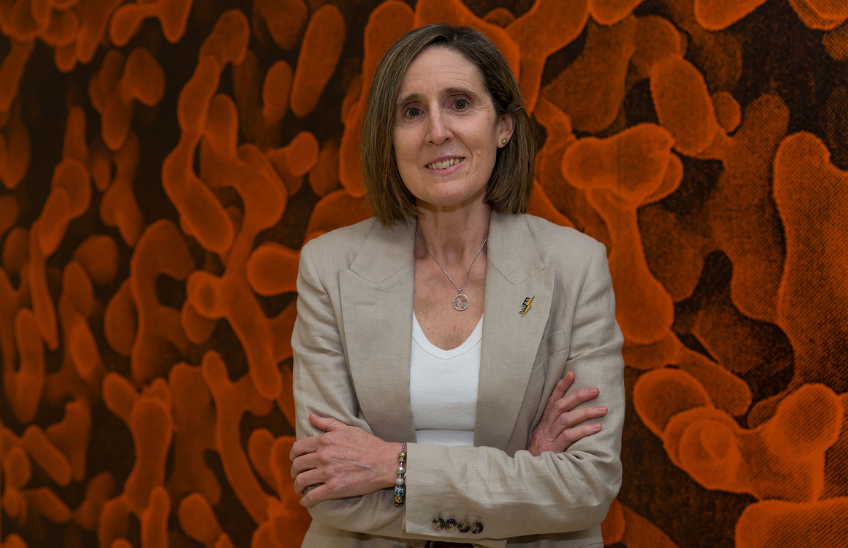Isabel Sola: "As long as there are viruses circulating and replicating, variants can appear that escape immunity".
The CSIC researcher, expert in coronavirus, gave a lecture at the University lecture as part of the SciencEkaitza activities.

PhotoManuelCastells/Researcher Isabel Sola (BIO'92).
24 | 06 | 2021
The CSIC researcher and co-director of the Coronaviruslaboratory of the National Center of Biotechnology (CNB) at that institution, Isabel Sola Gurpegui, gave a lecture lecture at the University of Navarra, within the activities of SciencEkaitza, an event organized by Aditech, coordinator of the Navarra System of research and development+i (SINAI). A graduate in Biology from the University of Navarra, Isabel Sola appealed to everyone's commitment and responsibility in view of the measure that will soon be applied to remove the mask in outdoor spaces and reminded that vaccines are effective against the disease but only partially reduce the transmissibility of the virus. The researcher was also in favor of vaccinating the child population, commented on the need to allocate resources for research and infrastructures and to maintain constant vigilance against viruses that could become pandemic.
"Very effective vaccines have been obtained that protect against disease and death, but as long as there are viruses that circulate and replicate, variants can appear that escape immunity," he confirmed. Sola addressed another of the questions that are currently being asked: How long does this immunity last, and will it be necessary to be revaccinated? "We have to be aware of the responses in real time by watching the reinfections that occur. The group population at greatest risk are the elderly, perhaps we should think about the preventive possibility of revaccinating them to increase their protection", he indicated.
The researcher also expressed her opinion on the suitability of vaccinating children. "In children the probability of severe infection is very low leave but they are infected just like adults and can transmit the virus. It is advisable to vaccinate the child population, as safely as possible, to prevent the virus from circulating and infecting a population at higher risk".
Isabel Sola pointed out that the most likely scenario over time is that the population will acquire an increasingly stable immunity. "It may be that the virus will produce some sporadic outbreaks, without a great impact, but requiring vigilance; and perhaps, over time, it will become a virus like the other coronaviruses that cause colds."
During her speech, Isabel Sola stated that climate change, alterations in ecological diversity and our own lifestyle may have favored the transmission of these coronaviruses from animal species to humans. "There are many environmental and social factors that may be contributing to pandemics. We have to be proactive. What is important is that there is epidemiological surveillance to have the capacity to detect viruses that can be pandemic, as has been done with the influenza virus."
Isabel Sola's group has been researching vaccines against coronaviruses since 1986: what is the virus like and what are the mechanisms it uses to cause disease and apply this knowledge to development of vaccines and antivirals. Sola advanced that, compared to vaccines that work with messenger RNA, the vaccine they are developing incorporates viral antigens that allow fill in immunity. "Science does not give immediate results. It bears fruit when it is cultivated with effort. Patience is necessary and it is a work team effort," he warns.
